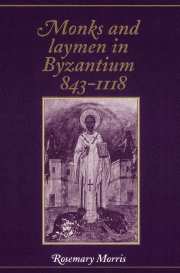Book contents
- Frontmatter
- Contents
- List of maps
- List of tables
- Acknowledgements
- Note on transliteration and citation
- List of abbreviations
- Introduction
- PART I FOUNDERS AND BENEFACTORS
- 1 The resurgence of the monastic life
- 2 Groups, communities and solitaries
- 3 Monastic founders
- 4 Monasticism and society
- 5 Piety, patronage and politics
- PART II PROTECTION AND SURVIVAL
- Appendix: Imperial privileges to monasteries, c. 900–1118
- Bibliography
- Index
4 - Monasticism and society
from PART I - FOUNDERS AND BENEFACTORS
Published online by Cambridge University Press: 10 December 2009
- Frontmatter
- Contents
- List of maps
- List of tables
- Acknowledgements
- Note on transliteration and citation
- List of abbreviations
- Introduction
- PART I FOUNDERS AND BENEFACTORS
- 1 The resurgence of the monastic life
- 2 Groups, communities and solitaries
- 3 Monastic founders
- 4 Monasticism and society
- 5 Piety, patronage and politics
- PART II PROTECTION AND SURVIVAL
- Appendix: Imperial privileges to monasteries, c. 900–1118
- Bibliography
- Index
Summary
Although the monastic state brought with it a different way of life and conferred distinct responsibilities on those who followed it, it would be wrong to consider monks as constituting a separate caste in Byzantine society. Their contacts with the secular world were often close and frequent and, though monastic tradition might decree the opposite, complete seclusion – a life ‘in the world but not of it’ – was, in fact, rarely practised. All the monks recorded in hagiography maintained contacts with the lay world around them and, indeed, their biographers expected that they should and were eager to chronicle such associations. For it was through their relationships with others, both religious and secular, that the power of the monastic saints could be demonstrated and, on a less elevated plane, that the rôle of monastic houses as centres of importance to the local community could be maintained. Two kinds of power were involved: the power that parresia, access to God and almost a familiarity with Him, could bring to monks, who thus provided a channel between the ordinary believer and the Deity, and, secondly, the practical influence always wielded by those individuals or institutions which could provide local and immediate leadership.
- Type
- Chapter
- Information
- Monks and Laymen in Byzantium, 843–1118 , pp. 90 - 119Publisher: Cambridge University PressPrint publication year: 1995



